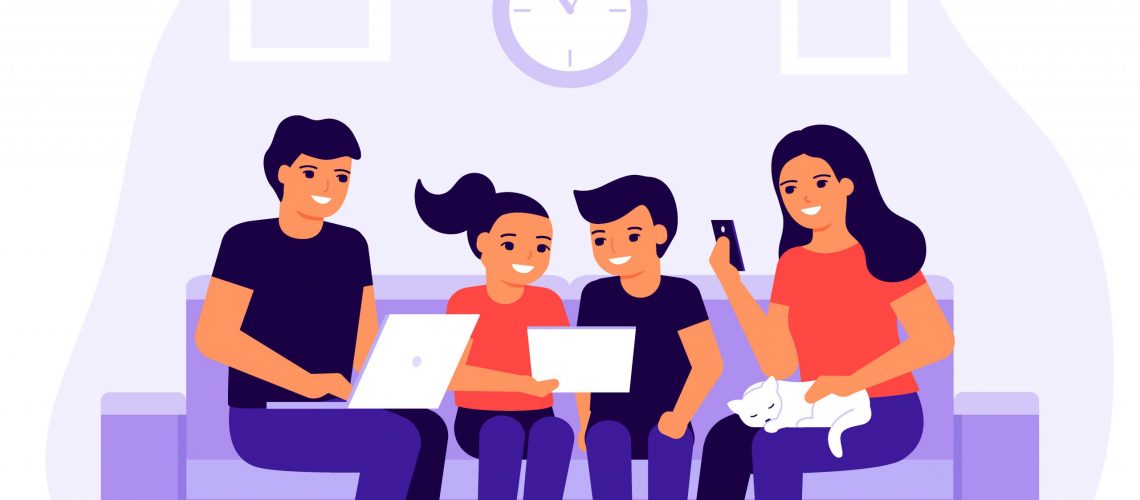Art of Protecting Your Kids Online
Gone are those days where teens and pre-teens were socialising in playgrounds and communities. Now social networking platforms, messaging rooms, virtual worlds, and blogs are how pre-teens and teens socialise now a days. It’s imperative that we help our children learn how to navigate these virtual places.
There are many downsides that we see while we are on social media platforms as the information sharing too much or while posting comments, photos, or videos that can damage a reputation or hurt someone else. It is never too early to think about your child’s safety online.
If you are a parent of a young child who is just starting to discover the online world, there are a few things to consider such as .. (a) Help your child learn to use technology with proper internet ethics and digital wellbeing. (b) Co-view or co-create at time with kids. (c) Consider using content filtering software’s. (d) Create a family Screen time agreement with tech free zones. (e) Tell your child not reveal personal information and overshare online. (f) Balance off-screen time and on-screen time. Focus on actual developmental needs. (g) Learn more about online platforms, explore reliable resources for parents so you can educate yourself.
Internet Safety Tips for Parents Having Pre Teens: –
* Many of the social media platforms and websites tools are accessible for members with 13+.
* Almost all images that we see online and works shown online could be copyright protected.
* Tell your parents what you are doing online. Always ask them to talk to trusted adult family members if they are unsure of anything.
* Don’t Add online friends without your permission. Advise them not to trust everything their online friends tell them.
* Advice kids to keep personal information always private: Full name. Address, Phone. You Plans and Birthdays.
* Advice kids not to post anything they didn’t want their teachers, family, friends, and future employees to see.
* You should tell kids not to believe everything, they read and see online as there are lots of incorrect and biased information.
* Kids must be taught to report if any cyberbullying is happening to them on any of the social platforms.
* Ask them to choose sensible email addresses and usernames. Use strong passwords along with two-factor authentication and tell them not to share them with others.
* Teach them to be polite and respectful at all times, they should be guided to behave the same way both, online and offline.
* Ensure kids balance their off-screen time and on-screen time. Motivate them to get outdoors and play sports like cricket, football, etc, which have physical tasks to do.
Internet Safety Tips for Parents Having Teens: –
* Internet Safety – Have frequent conversations with your child as they will not be aware of the dangers that can happen online, so it is very important to know who they talk to and what kind of personal information they are sharing online.
* Parental Control – Almost all electronic gadgets and applications we use have built-in parental controls that allow you to limit the amount of time your child can spend online, restrict their access to explicit content, and switch off functions like shopping and chatting filtering controls are particularly useful at preventing teens from accidentally come across content that might cause inconvenience to them.
* Family Email – Set up a family email address that your children can use when signing up for games and other online platforms.
* Online Purchases – Many applications and games give their users the option of buying additional functionalities, additional points/coins Etc. Children may purchase without even realising so it’s strongly recommended you disable in-app purchases using your smartphones and laptops.
* Activate Safe Search – Minimise the risk of your kids when comes across inappropriate content in response to online search by activating “safe search”.
* Agree on what to do when things go inappropriate – We must speak to our children about what to do if they come across something on the internet that bothers them. This shouldn’t be closing the laptop lid or turning off the screen of the smartphone when we are near them.
* Play it Safe – Parents must carefully choose safe and appropriate games for their child to play online. We should check the suggested rating (age) and should also check if a game allows for player interaction and if there is a safe chat mode feature available.
* Teach Kids that Scanning a QR code sent by others / Providing UPI / PIN / OTP to others, means loss of money or loss of personal data.



